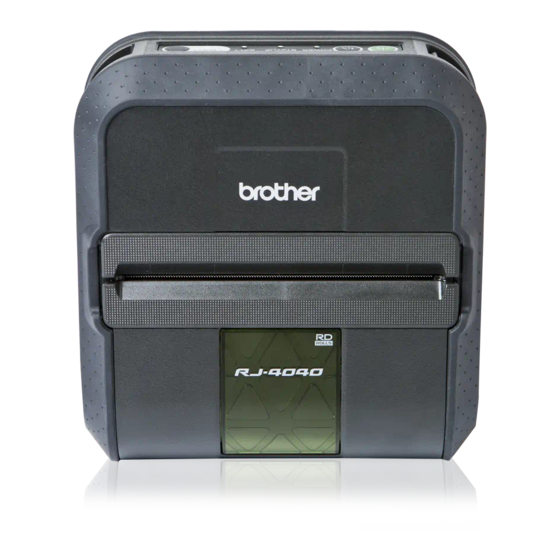Brother RuggedJet RJ-4040 User Manual - Page 31
Browse online or download pdf User Manual for Software Brother RuggedJet RJ-4040. Brother RuggedJet RJ-4040 33 pages. Mobile printer
Also for Brother RuggedJet RJ-4040: Quick Reference Manual (2 pages), Software Manual (48 pages), Quick Reference Manual (1 pages), User Manual (34 pages), Product Safety Manual (22 pages)

Appendix B
Using BOOTP to configure the IP address
BOOTP is an alternative to RARP that has the advantage of allowing configuration of the subnet mask and
gateway. In order to use BOOTP to configure the IP address make sure that BOOTP is installed and running
on your host computer (it should appear in the /etc/services file on your host as a real service; type
man bootpd or refer to your system documentation for information). BOOTP is usually started up via the
/etc/inetd.conf file, so you may need to enable it by removing the "#" in front of the bootp entry in that
file. For example, a typical bootp entry in the /etc/inetd.conf file would be:
#bootp dgram udp wait /usr/etc/bootpd bootpd -i
Depending on the system, this entry might be called "bootps" instead of "bootp".
Note
In order to enable BOOTP, simply use an editor to delete the "#" (if there is no "#", then BOOTP is already
enabled). Then edit the BOOTP configuration file (usually /etc/bootptab) and enter the name, network
type (1 for Ethernet), MAC Address (Ethernet Address) and the IP address, subnet mask and gateway of
the print server. Unfortunately, the exact format for doing this is not standardized, so you will need to refer
to your system documentation to determine how to enter this information. Some examples of typical
/etc/bootptab entries include: ("BRN" below is "BRW" for a wireless network.)
BRN310107 1
00:80:77:31:01:07 192.168.1.2
and:
BRN310107:ht=ethernet:ha=008077310107:\ip=192.168.1.2:
Certain BOOTP host software implementations will not respond to BOOTP requests if you have not included
a download filename in the configuration file. If this is the case, simply create a null file on the host and specify
the name of this file and its path in the configuration file.
As with RARP, the print server will load its IP address from the BOOTP server when the printer is powered on.
Using APIPA to configure the IP address
The Brother print server supports the Automatic Private IP Addressing (APIPA) protocol. With APIPA, DHCP
clients automatically configure an IP address and subnet mask when a DHCP server is not available. The
device chooses it's own IP address in the range 169.254.1.0 through to 169.254.254.255. The subnet mask
is automatically set to 255.255.0.0 and the gateway address is set to 0.0.0.0.
By default, the APIPA protocol is enabled. If you want to disable the APIPA protocol, you can disable it using
BRAdmin Light or Web Based Management (web browser).
B
B
B
27
